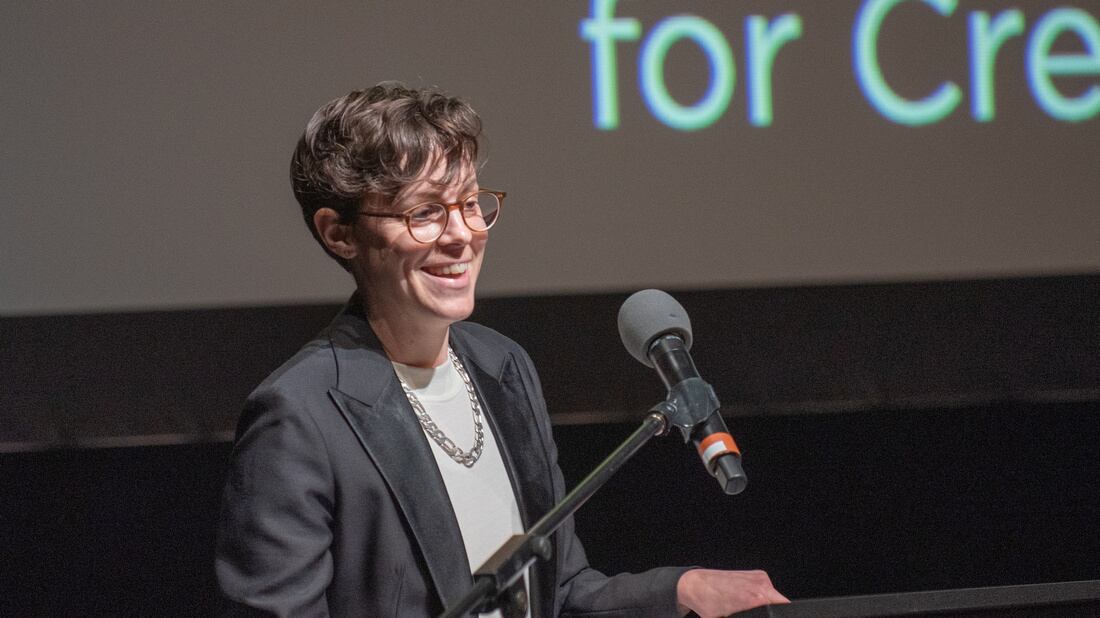“I think it’s safe to say there are people who deserve this award more than I do. And that might even be true, but it’s definitely safe,” said poet Gary Miranda to a chuckling crowd as he accepted the Stewart H. Holbrook Literary Legacy Award at this year’s Oregon Book Awards on April 3 at Portland Center Stage.
Miranda added: “What’s both true and safe to say, is that when some 60-plus years ago I decided I wanted to be a poet, winning an award such as this was the furthest thing from my mind. I just wanted to impress beautiful women.” He looked into the crowd, at a seat toward the front and thanked his wife, whom he referred to as the beautiful woman he’s been “trying to impress for the last 43 years without much success. So I’m hoping this award will help with that.”
After the laughter and clapping, Miranda recited the opening lines of “Ars Poetica,” Horace’s poem about the art of writing poetry: “Ambience, feckless, ineluctable:/sometimes you think it would all be clear/if you merely increased your vocabulary,/learning words that line up possibilities/like birds on a wire, or clothespins.” These lines got the audience mm-hmming in understanding.
When Eric Tran got onstage to accept the Stafford/Hall Award for Poetry for Mouth, Sugar, and Smoke, more laughs were had. “Thank you all for giving me the opportunity to wear this suit,” Tran joked of his burnt orange suit. After the laughter quieted, he took on a more serious tone, addressing the themes of his work: love in the face of addiction, isolation, possibility. “I never could have believed anyone could have looked through my own window, that we might find each other through poetry and literature and might somehow feel less lonely,” he said.
Lauren Kessler accepted the Frances Fuller Victor Award for General Nonfiction for Free: Two Years, Six Lives, and the Long Journey Home, a book that chronicles six peoples’ experiences after incarceration. “Six hundred thousand men and women leave prison and come to our communities every single year,” she said. “That’s because we incarcerate more than 2 million people—this is the story of six. From caged to free. What stood in their way and how they persisted. I am accepting this award on their behalf. Because it’s their book.”
Another powerful moment came when Casey Parks accepted the Sarah Winnemucca Award for Creative Nonfiction for her memoir, Diary of a Misfit. A former reporter for The Oregonian who now writes for The Washington Post, Parks combines research, reporting and memoir in Misfit as she uncovers the story of a country singer named Roy Hudgins who, as Parks’ grandmother put it, was “a woman who lived like a man.”
In her acceptance speech, Parks told her own story of growing up gay in a Southern Christian culture and a family that believed her soul was with Satan. “I started working on this book in 2002, soon after I came out as being gay,” she said. “My pastor asked God to kill me, and my mom told me that thinking of me made her want to throw up. And I really thought the rest of my life was going to be miserable.…Luckily, Portland exists. The lesbian Xanadu.”
After the laughter died down, Parks said that for so many people in this country, there isn’t a Portland yet: “There’s a record number of anti-trans bills that have been passed in the last year, and those people are maybe still waiting for a heaven of sorts. So, this award is for them.”
From the children and young adult literature awards for books that represent what one of the authors referred to as “what Americans actually look like” to Sindya Bhanoo’s short story collection Seeking Fortune Elsewhere, each of the selections at this year’s Oregon Book Awards highlighted a well-deserving writer doing what writers are supposed to do: share stories that increase our understanding of the world, of each other, of ourselves.
